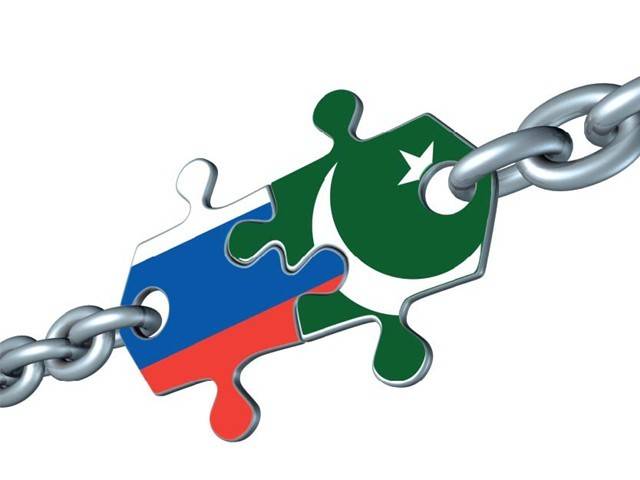ISLAMABAD -Speakers of seminar on 'Pakistan-Russia Relations: Emerging Strategic & Economic Dynamics' held here at Islamabad Policy Research Institute (IPRI) on Wednesday called for finding more avenues for the promotion of better strategic relations between the two countries.
Scholars, intellectuals, researchers, former ambassadors and diplomats attended the conference. The seminar was chaired by Dr Azmat Hayat Khan, former Vice Chancellor University of Peshawar. The speakers included Ambassador (Retd) Mohammad Khalid Khattak, former Ambassador to Russia (2008-2013), Dr Zafar Nawaz Jaspal, Director and Associate Professor School of Politics and International Relations (SPIR),Quaid-i-Azam University (QAU), and Syed Muhammad Ali, Assistant Professor Department of International Relations, National Defence University (NDU).
In his opening address, President IPRI, Ambassador (Retd) Sohail Amin described Russia as a major power with which Pakistan has been cooperating within the ambit of joint working groups and intergovernmental commission on economic cooperation. He highlighted the significance of recent high-level visits from Pakistan to Russia including the visits of President Zardari in 2011 and the Chief of Army Staff, Ashfaq Pervez Kayani in 2013. He also said that Pakistan was keen on developing relations with Russia.
Dr Zafar Nawaz Jaspal from QAU said that in international politics, convergence of interests made alliances. He pointed out that political, diplomatic and strategic relationship between Pakistan and Russia enhanced when political head-level engagement started after Musharraf's visit to Russia. He highlighted various common interest areas shared by Pakistan and Russia. These were combating terrorism, especially, multinational organisations having puritan approach, bilateral trade, stability in Afghanistan particularly after withdrawal of US-Nato forces in 2014, and centrality of Central Asia, as Pakistan is a promising avenue from economic perspective and lastly Arms Control and Disarmament for prevention of an arms race in outer space (PAROS). He further added that given the importance of scientific higher education, Pakistan should focus on sending students to Russia as well, as Russia had advanced technology and education system. Similarly, space technology and transfer of military hardware are other potential areas where both countries could enhance their cooperation. He concluded by saying that bilateral relations between Pakistan and Russia were on positive trajectory.
Ambassador (Retd) Khalid Khattak shed light on shift in Russian disposition. Khattak said that Russians had shed the thinking of cold war strategy and had started to adopt policy of 'Age of Network Diplomacy'. He also said that Russians understood the position of Pakistan in terms of Afghanistan conundrum and considered it a part of solution and not of problem. According to him, main convergence points between both countries included security and economic cooperation both in bilateral and regional context. In terms of Russia-US relations, he said that they had divergences and convergences as well in the areas like disarmament, countering terrorism, drug trafficking and global security.
Professor Syed Mohammad Ali from NDU was of the view that two centuries old global economic system was changing, moving from Atlantic-based economy to Pacific-based economy. He emphasised that Russia aimed to be 'Energy Bridge' between Europe and Asia Pacific in the Asian century. Pak-Russian relations should be based on common interests instead of an alliance against other regional and international powers. In addition, it was important to restructure bilateral relations based on societal, economic, academician, business, and cultural exchanges to ensure their long-term and broad-based sustainability, he said. Gwadar Port should be linked with the national railway track with the Russian help in order to allow heavy goods to be transported cheaply from Arabian Sea to Central Asia and East Asia. Lastly, he said that prospects of coal, gas, nuclear-based energy must be explored due to extensive Russian expertise in those sectors.
Dr. Azmat Hayat Khan, former Vice Chancellor, Peshawar University in his concluding remarks said that Russians both at government and people to people level welcome Pakistan. He highlighted that Russia was trying to catch up economically, strategically and technologically with its rival the US, which it would acquire soon. Dr. Khan said that Russia feared the most from Afghanistan's drugs and weapons. Moreover, he analysed that after the withdrawal of US led Nato forces from Afghanistan in 2014, myth of Nato influence would lose its importance. He also added that current scenario was also very crucial for Pakistan in the wake of on-going talks between Taliban and the US government. Anthropological outlook was needed to understand the complex phenomenon of all stake-holders in Afghanistan. Similarly, lack of political wing within Mujahedeen was also a hindrance in dealing with them. However, he added that there was a huge room for education and exchange programme between Pakistan and Russia. So, Pakistan should respond positively to all the offers made by Russians.
Several new avenues of cooperation between Pakistan and Russia were identified during the conference, which included greater collaboration in the field of economy, trade, promotion of regional stability and integrity, countering terrorism, and enhanced people-to-people contacts.
Saturday, April 20, 2024
Speakers call for promoting Pakistan-Russia relations

Policitising Tragedy
April 20, 2024
Tehran to Rafah
April 20, 2024
A New Leaf
April 20, 2024
A Tense Neighbourhood
April 19, 2024
Dubai Underwater
April 19, 2024
Dangers of Deepfakes
April 20, 2024
Feudalism
April 20, 2024
Kite tragedy
April 19, 2024
Discipline dilemma
April 19, 2024
Urgent plea
April 19, 2024
ePaper - Nawaiwaqt
Advertisement
Nawaiwaqt Group | Copyright © 2024





